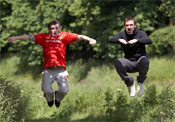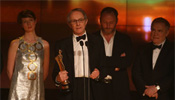Last seen in Ireland clutching a fistful of IFTAs for his acclaimed feature ‘The Wind that Shakes the Barley’, IFTN catches up with Brit director Ken Loach ahead of the nationwide release of his latest pic ‘Looking For Eric’.
Creating a stir at the Cannes Film Festival last month, ‘Looking for Eric’ sees Loach and his screenwriting partner Paul Laverty team with Manchester United footballing legend Eric Cantona to produce one of their most hotly anticipated features to date. Once again the award winning director brings his unique directing flair to the big screen and creates a touching story that explores themes of loss, friendship, family, depression and survival.
IFTN finds out more…
IFTN: Eric Cantona and the French producing team approached yourself and Paul about doing this project. Why do you think they chose you?
KL: I don’t know, we were very flattered really. I think they’d seen one or two films we’d done and thought we might have things in common.
Eric Cantona is a producer on the project – how was he involved in the development of the film?
The project started with Eric and without him it wouldn’t exist. He came over and we talked about the kindof film we might make together and he was interested in the relationship he had with the fans. He talked about one fan in particular who had followed him in his career so Paul went away and we started to think about what the film could be. In the end we couldn’t make that storyline work so Paul started with a blank sheet of paper and wrote the character of Eric Bishop. We knocked it backwards and forwards and then Paul wrote the script which we then showed to Eric hoping he would like it. Which he did, and that was it really.
Did Cantona have any other involvement in the story development?
No, actually writing the script is not something you can share around too much. He just wrote back and said, very kindly, “ManU-fique!”
Was it always going to be a vehicle for Eric Cantona to star in?
Eric didn’t lay down any conditions, he just said “lets do a film”, so the idea of Eric being a kind of presence in Little Eric’s mind was all Paul’s idea.
Are you still surprised when Paul comes up with ideas like this?
Yes, he’s a remarkable writer really.
The Eric Cantona character in the film is how Little Eric imagines him to be – how close is that to the man himself?
I think it’s a mixture. It’s partly the real Eric, like when he’s saying his favourite moment was not a goal it was a pass, that’s Eric himself – he said that. And then the cod philosophy – that’s Paul. Paul spent a couple of days talking to Eric so it’s also Eric having fun with his public presence. We assume that what’s in Little Eric’s mind is a mixture of the real Eric and this imagined person.
 Looking for Eric
Looking for Eric |
What do you think was Cantona’s motivation to make this film?
He’s an actor. He’s been acting for ten years or more now and he’s very experienced. Cinema is his new passion and it was a natural thing to do. Eric is a complete professional and he works very hard. He’s very self motivated and what was really difficult for him was doing a film in his second language. He was in England for seven years but he’s been back in France for 12. His English is good, but I know from trying to do interviews in French it is very difficult, and to carry it off in your second language is pretty good.
Despite being flattered I don’t think we would have done this if we felt that there wasn’t something real to talk about, which in the end is about not being who you thought you could be when you’re middle aged. Little Eric is middle aged and his younger self thought he would be just much happier and more integrated - his family wouldn’t have fallen apart. His life is in ruins really. It’s about how families can go spectacularly wrong, life can go wrong and maybe how you can pull it back together again.
There has been a lot of buzz about the film and the fact that it’s a collaboration between yourself and Cantona. How has that been?
It’s very nice and it’s very exciting. We’re under no illusions that it’s Eric’s presence that made it happen. It’s also nice to come back to Ireland with a film that’s very different to the last one we came with so that’s nice as well
How do you think Irish audiences will take the film?
I don’t know. I think there’s a lot of football fans in Ireland but I also think women seemed to like it more if not as much as men. I think that’s great because you don’t have to be a football fan to follow it because he’s such a magnetic person. Little Eric’s first partner also emerges very strong – she keeps herself together very well until something shakes her again. I think she’s a terrific character and because Eric Cantona is in the film you tend not to talk about the other characters so much, but I think she’s a terrific character and Stephanie [Bishop] was just right for it.
In essence it’s a love story really?
Yes, it’s a love story on many different levels. Firstly, there is your first love and then there is the love for his two stepsons (which he’s inherited from his second partner) - although it’s very perverse because they play him up and tear him apart. Then there is his love of football and also the solidarity between his friends, which they wouldn’t describe as love in any way because they’d be hugely embarrassed, but it’s there.
How did you approach the making of this film in terms of casting?
Well until we’ve got the script sorted we don’t really begin to work on the actual project – we don’t think about the casting or anything really. Then we saw lots and lots of people, we made sure everyone was from Manchester in the same way we had people from Cork when we did the Irish film. We keep it as truthful as you can to the people.
How would you describe your own directing style?
Oh, I don’t think I could. I just try to work upwards in a logical way. Always ask the toughest questions; “would you really believe the person you’ve cast is really that person in the film rather than somebody pretending or putting on a funny accent? If you were doing a documentary would you believe it?” That’s always the criteria. Be really tough with yourself and if there’s any hint of a false note, you’ve just got to root it out. Everything follows from that.
Once you begin shooting – how much contact do you have with the actors?
We do improv before we start. Then whilst shooting we keep the numbers down as much as possible and we just chat it through as we go. It should be as simple as possible, the more complicated it is the less good the performances get. We want actors to act from their stomach, not from their head and just be instinctive and intuitive. The more you discuss it the more it becomes filtered through their intellect and often what you want is an instinctive response.
Moving on to the last time we saw you in Ireland it was for The Wind That Shakes the Barley – were you surprised by the success of that film?
We knew we were on to something really. Paul’s script was so good and you could see as people were playing it there was a passion about what they did. If you trust the material, trust the actors properly and the people who you’re working with then it should be alright. We did have a sense that there was something magical about it.
And you won a bunch of IFTAs – how did that feel?
 Best Film winner at the IFTAs
Best Film winner at the IFTAs |
Yes it was lovely. It was very nice for all the people who had worked on the film. That was a good night.
Looking back on your experience filming in Ireland, is there anything you would have liked to be different?
Everyone was very nice and we had a really good welcome here. I’d like there to have been more of a stronger film infrastructure around Cork. That would have been good because it’s a great place to work but it did mean that more people had to come from Dublin than we’d imagined. They were all terrific, it’s nothing against them, but you kind of feel well maybe Cork’s a big enough city to have more of a film infrastructure there. I think the secret lies in the diversification of television. Obviously you can’t sustain a film community on two feature films so if TV was diversified around the country then you would have that bread and butter work for film workers and then when a film comes along you’ve got an infrastructure you can build on.
Finally, any plans to shoot in Ireland again?
Not immediately but you never know. It was a good experience but we’ll be back, maybe, one day.
